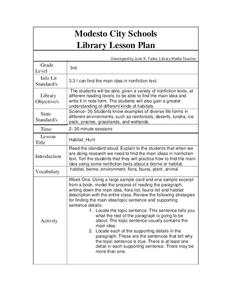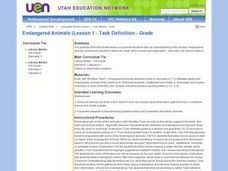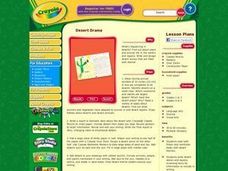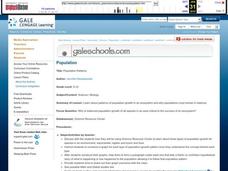Curated OER
Using a Title to Determine Main Idea (Nonfiction)
Young readers explore a nonfiction text for its main idea. They will listen to the book Animal Sight by Kirsten Hall, and then observe as the teacher models a main idea think-aloud. Later, for independent practice, they listen to the...
Curated OER
Discovering Saturn, The Real "Lord of the Rings"
Reading, writing, and rings! A lesson from NASA combines space science with authentic reading and writing tasks. Included in this lesson are pre-reading activities, four mini informational booklets on Saturn, a structured note-taking...
The New York Times
Writing Fiction Based on Real Science - NYTimes.com
Refuse to alienate your scientific-minded young scholars during your creative writing unit. Learners explore how literary writing can reflect observable fact, and be based in actual science. The links include examples of fiction and...
Curated OER
Lesson 1: Identifying Information in Nonfiction
If you are in need of a lesson plan on identifying information in a non-fiction text, look no further. The class learns how to use a KWL chart to identify explicit information in the book, Frogs by Gail Gibbons. They fill out the KWL...
Curated OER
Exploring Arizona's Biotic Communities Lesson 1: Mapping Biotic Communities
As part of a unit on Arizona's biotic communities, young ecology learners create a map. They describe how humans and animals adapt in their habitat. They take notes and create graphic organizers from articles they read. Beautiful maps,...
EngageNY
Close Reading of Bullfrog at Magnolia Circle: Main Ideas about the Bullfrog
As your class reaches the end of the book Bullfrog at Magnolia Circle, the seventh lesson in this literary unit helps third graders transition from reading narrative to expository writing. Scholars develop their note-taking skills as...
Curated OER
Insects
It's a fact: kids love bugs! With this instructional activity, young learners explore reading informational texts and conducting research while learning about their favorite insects. Spark learners' interest by reading a book about one...
National Math + Science Initative
Reading an Informational Text: "It All Started with Sputnik"
Sputnik was one of the greatest scientific advancements of the 1950s, and this reading lesson does it justice. Pupils start off with pre-reading questions and a video. They then read an excerpt from an article, which is accompanied by...
Curated OER
Publisher Brochures
Students create brochures on subjects they are studying in Publisher. In this nonfiction writing lesson, students use Publisher to create a brochure telling all the main ideas of a topic they are studying. Students use text boxes, fonts...
Curated OER
A Pill with a View
Learners brainstorm a list of potential uses for micro-video technologies. After reading an article, they analyze the development of a new pill-sized camera. In groups, they create a children's book that shows them the various systems of...
Curated OER
Rachel's Life is in a Hole
Explore how lack of access to water impacts peoples' lives in poor countries. Through text reading and discussion, middle schoolers are presented with the story of a young girl who lives and functions with limited water resources. They...
New York State Education Department
TASC Transition Curriculum: Workshop 5
Are video games sports? Pupils investigate this question as well as various nonfiction selections to learn more about claims and the support that defines them. All of the selections mimic the rigor on state tests and encourage close...
DePaul University
The Working Tools of Insects
The animal kingdom is full of interesting organisms that have unique ways of surviving. Children read about different insects that have special tools for building homes and protecting themselves. When finished, learners identify the main...
Curated OER
Habitat Hunt
Third graders read several nonfiction texts and practice finding the main idea for the text as well as learn about various habitats. In this main idea lesson, 3rd graders read several nonfiction texts and make habitat cards. Students...
Curated OER
Ornithology and Real World Science
Double click that mouse because you just found an amazing lesson plan! This cross-curricular Ornithology lesson plan incorporates literature, writing, reading informational text, data collection, scientific inquiry, Internet research,...
Curated OER
To a Place Like No Other (Galapagos Islands)
Students research and collect information on the Galapagos Islands. In this Galapagos Islands lesson, students find information for a jeopardy game, a first person account and a geological discovery related to the Galapagos Islands.
Curated OER
Endangered Animals (Lesson 1 - Task Definition - Grade 3)
Third graders use The Big Six to gain an understanding of the phrase 'endangered animal.' They select an animal, research it and write a report about it. They also make a poster of the animal.
Curated OER
Weather Proverbs
Define and write proverbs! Learners define proverbs, use the Internet to find weather-related proverbs, and talk with their parents to learn other proverbs. There's a well-structured worksheet included here.
ReadWriteThink
Webcams in the Classroom: Animal Inquiry and Observation
Boost observational skills with an inquiry-based lesson that takes scholars on a virtual field trip. With help from webcams, learners observe animals in a zoo or aquarium. Observations go into a journal and a discussion is held to review...
Curated OER
Desert Drama
Students read both fiction and nonfiction books with desert themes. Then they write desert stories and reports, reviewing texts for information to include in writing. Students also design desert scenes with details and setting elements...
Curated OER
Inventing and Presenting Unit 1: Analyzing Nonfiction and Inventing Solutions
Middle schoolers read about and identify patterns in the invention process. Students discuss and write about information learned from research. Middle schoolers compile a list of problems, choose one, write a problem statement, and...
Curated OER
Soaring High with Kites
Students make kites from patterns. They write haiku poetry. They listen to stories about kite festivals in different countries.
Curated OER
Nocturnal vs. Diurnal Animals
First graders identify nocturnal and diurnal animals. In this animal lesson, 1st graders discuss the differences between animals that are active during the day and those that are active at night. Students write summaries about their...
Curated OER
Population Patterns
Students study patterns of population growth in an ecosystem and why populations must remain in balance. They interpret basic population graphs and suggest scenarios about different population growth patterns in an ecosystem.

























